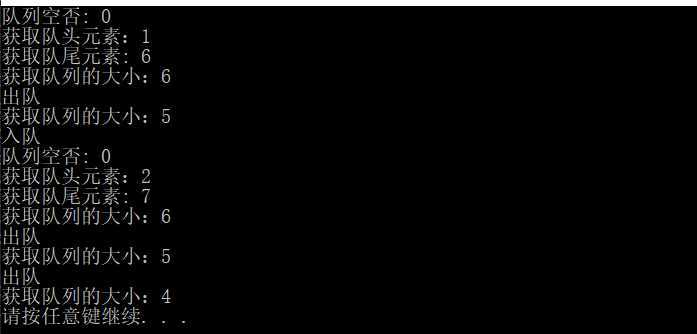c语言中(不是C++)具体实现堆栈代码,后进先出原理我懂!
Posted
tags:
篇首语:本文由小常识网(cha138.com)小编为大家整理,主要介绍了c语言中(不是C++)具体实现堆栈代码,后进先出原理我懂!相关的知识,希望对你有一定的参考价值。
用链表,从头插入,从头弹出就行。链表实现,大致代码如下:
struct Node
// 其他数据类型,就不写了。
struct Node * next;
;
struct Node head; //全局头节点,本身不存放数据。
head.next = NULL;
push_node( struct Node* node) //后进
node.next=head.next;
head.next = node;
struct Node* pop_node() //先出
if( head.next == NULL)
return NULL;
struct Node* temp = head.next;
head.next = temp.next();
return temp;
参考技术A I think the implementation of a stack (in both C and C++) lies on pointer.
Try understand pointer first 参考技术B 你在调试的时候就知道了,那些汇编程序就是你想要的结果 参考技术C selemtype
&e
作为函数参数是,是引用类型,与实参一样。函数里修改e的话,实参也会修改
selemtype
这个类型具体指什么。
出错信息是什么
用两个栈实现一个队列(C++)
分析
- 栈:后进先出
- 队列:先进先出
要使用两个栈实现队列(先进先出),主要思路是
1.插入一个元素:直接将元素插入stack1即可。
2.删除一个元素:当stack2不为空时 ,直接弹出栈顶元素,当stack2为空时,将stack1元素逐个弹出并压入stack2,然后再弹出栈顶元素。
具体看下面的代码。
代码实现
#include <iostream>
#include <stack>
using namespace std;
template<class T>
class Queue
private:
stack<T> s1;
stack<T> s2;
public:
//入队
void Push(const T &val);
//出队
void Pop();
//返回队首元素
T& Front();
//返回对尾元素
T& Back();
//判断队列是否为空
bool Empty();
//返回队列大小
T Size();
;
//归纳:
//1.插入一个元素:直接将元素插入stack1即可;
//2.删除一个元素:当stack2不为空时 ,直接弹出栈顶元素,当stack2为空时,将stack1元素逐个弹出并压入stack2,然后在弹出栈顶元素;
//入队
template<class T>
void Queue<T>::Push(const T &val)
//栈s1做队列的队尾,s2做队列的对头
s1.push(val);
//出队
template<class T>
void Queue<T>::Pop()
if (!s2.empty())
s2.pop();
//s2为空时,s1中的所有内容逐一出栈压入s2
else
while (!s1.empty())
s2.push(s1.top());
s1.pop();
//压入之后,s2的存放顺序正好和s1的相反,符合队列的先进先出,直接s2出栈
if (s2.empty())
cout << "队列为空" << endl;
exit(1);
s2.pop();
//返回队首元素
template<class T>
T& Queue<T>::Front()
if (!s2.empty())
return s2.top();
//s2为空时,s1中的所有内容逐一出栈压入s2
else
while (!s1.empty())
s2.push(s1.top());
s1.pop();
//压入之后,s2的存放顺序正好和s1的相反,符合队列的先进先出
if (s2.empty())
cout << "队列为空" << endl;
exit(1);
return s2.top();
//返回对尾元素
template<class T>
T& Queue<T>::Back()
//s1不为空直接取
if (!s1.empty())
return s1.top();
//s2不为空,把s2中的内容放回s1,然后返回
while (!s2.empty())
s1.push(s2.top());
s2.pop();
if (!s1.empty())
return s1.top();
else
cout << "队列为空" << endl;
exit(1);
//判断是否为空
template<class T>
bool Queue<T>::Empty()
if (s1.empty() && s2.empty())
return true;
else
return false;
//返回对列尺寸
template<class T>
T Queue<T>::Size()
return s1.size() + s2.size();
int main()
Queue<int> q;
q.Push(1);
q.Push(2);
q.Push(3);
q.Push(4);
q.Push(5);
q.Push(6);
cout << "队列空否: " << q.Empty() << endl;
cout << "获取队头元素:" << q.Front() << endl;
cout << "获取队尾元素: " << q.Back() << endl;
cout << "获取队列的大小:" << q.Size() << endl;
cout << "出队" << endl;
q.Pop();
cout << "获取队列的大小:" << q.Size() << endl;
cout << "入队" << endl;
q.Push(7);
cout << "队列空否: " << q.Empty() << endl;
cout << "获取队头元素:" << q.Front() << endl;
cout << "获取队尾元素: " << q.Back() << endl;
cout << "获取队列的大小:" << q.Size() << endl;
cout << "出队" << endl;
q.Pop();
cout << "获取队列的大小:" << q.Size() << endl;
cout << "出队" << endl;
q.Pop();
cout << "获取队列的大小:" << q.Size() << endl;
system("pause");
return 0;
运行测试

以上是关于c语言中(不是C++)具体实现堆栈代码,后进先出原理我懂!的主要内容,如果未能解决你的问题,请参考以下文章